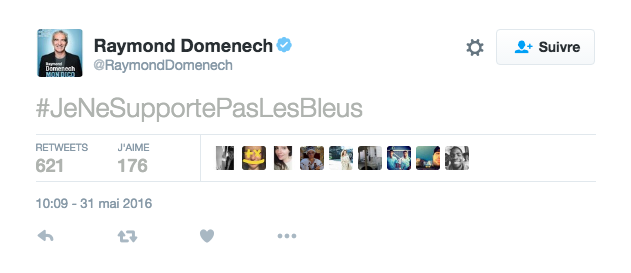
In eyebrow-raising Twitter fodder this week, the French former professional soccer player and coach Raymond Domenech tweeted, "#JeNeSupportePasLesBleus," which translates to "I can't stand the Blues."

This was weird—especially in advance of the Euro 2016 event, which France is hosting this year. "The Blues" is a nickname for French national sports teams (because, you know, of the blue uniforms). But it refers most often to the national soccer team ... which Domenech used to coach.
Later the same day, Buzzman CEO Georges Mohammed-Chérif shared the same sentiments on his Facebook page:

OK: A polarizing hashtag proclamation from Domenech, then a super-stylized portrait from a guerrilla agency head? Something else is going on here.
A campaign video, diffused soon after this sly social push, elaborates. Domenech appears in the first scene, vehemently saying, "I have never supported the Blues." Other well-known French faces follow, including rapper Oxmo Puccino, soccer player Frank Leboeuf and journalist Laurence Ferrari, their disdain for the "blues" melting into an intolerant din.
As the video progresses, it becomes clear that the blues they're referring to have nothing to do with soccer.
Les Bleus isn't just a sports reference; it's also the term for bruises. Created for the nonprofit group Elle's Imagine'nt, this is actually an awareness push for a disturbing statistic: Over the course of the Euro 2016, 10 women in France will likely die as the result of domestic violence.
This statistic stems from a European Counsel study that found that, every two days in France, a woman dies under the fists of a partner (who is a man in 98 percent of cases, per the European Commission). The study adds, "Domestic violence is the principal cause of death and disability for women between 16 and 44 years old—before cancer, car accidents and war."
That's an ugly fact, uglier still because it isn't often reported, nor is it something we can visibly see—and yet, for the figures to be so significant, its victims or perpetrators must often brush by us, entirely unremarked upon, in the streets or in common company.
While the work here is female focused, Elle's Imagine'nt also provides stats on domestic violence (both psychological and physical) toward men: In 2008, about 110,000 victims were male, per the National Observatory of Delinquency. 27 were killed as a result (fewer, but no less significant, than the 157 women killed that year), and only 5 percent of affected men file complaints.
Elle's Imagine'nt acts as a place of shelter, psychological support and legal, administrative and social aid for women experiencing domestic abuse. In the case of "Je Ne Supporte Pas Les Bleus," created by Buzzman (natch!), it hopes to raise both awareness and funds to help rebuild broken lives: The video concludes, "You, too, can challenge domestic violence."
We're often asked for our money, but the world is filled with more causes than we can see to. What wins our support is what seizes our surprise—and snags our emotions—long enough for us to act. The approach here, timed in advance of Euro 2016, does this quite nicely, and also targets patriotic sports fans—a broad group that may not often be addressed by the typical domestic violence fare.
It's an unpleasant, but not unwelcome reminder that even during a period of unifying sports jubilee, balls aren't the only things likely to get kicked around this month.